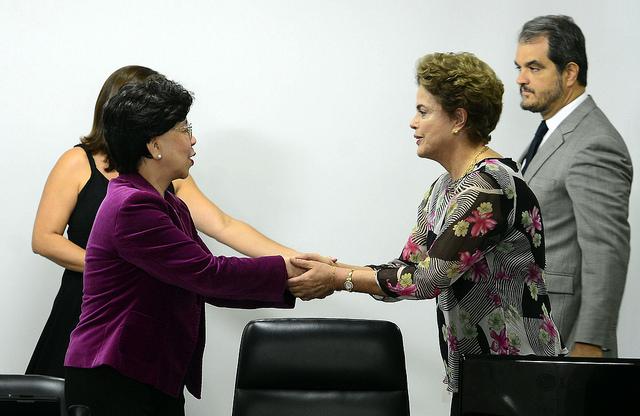Leaders from the World Health Organization (WHO) and its Pan American Health Organization (PAHO) office continued their mission today to assess Brazil's response to the Zika virus outbreak, as the country's health ministry reported 360 more suspected microcephaly cases.
In US developments, two congressional committees took up Zika discussions, asking about what response steps are under way and what level of funding is needed.
Chan weighs in from Brazil
At a media briefing today at the Fiocruz Institute in Rio de Janiero, WHO Director-General Margaret Chan, MD, MPH, thanked Brazilian authorities for providing global health officials with a firsthand look at the outbreak and response and pledged more international help in battling the disease.
In a separate briefing yesterday, she said, "This will be a long journey but government commitment is commendable and we are here to support them so we can embark on this journey together. Based on what I have seen today and what I've heard, the mosquito is difficult but it cannot beat Brazil."
As part of the mission, Chan and her WHO and PAHO colleagues met with Brazil's president and its ministry officials and talked to researchers.
Brazil adds to microcephaly total
Brazil's health ministry today said in its regular update that 360 more suspected microcephaly cases have been reported, while 113 earlier ones have been ruled out, according to a statement translated and posted by Avian Flu Diary, an infectious disease news message board. The condition involves infants who have smaller-than-normal heads and underdeveloped brains.
According to the ministry's latest numbers, officials are still investigating 4,107 suspected microcephaly cases. Since its last update a week ago the health ministry has confirmed 75 more cases, raising that total to 583.
Over the course of the outbreak a total of 5,640 suspected cases have been reported, with 950 ruled out.
Studies have not definitively linked Zika virus to microcephaly, but the body of evidence is growing. A case-control study was recently launched in some of Brazil's hardest-hit areas to help clarify the suspected link.
PAHO mission in Colombia
Meanwhile, representatives from PAHO, along with other outside experts, are on the ground in Colombia this week on a technical mission to assess that country's response efforts. According to PAHO statement yesterday, Colombia has reported about 37,000 Zika virus infections, 6,300 of them in pregnant women.
Colombia's Zika epidemic started after Brazil's, and health officials are closely watching for a similar rise in microcephaly cases. If the same pattern plays out, experts have said an increase in microcephaly would be seen starting in about June. Colombia is one of six countries that have reported a rise in Guillain-Barre syndrome (GBS), a rare neurologic complication from infectious diseases that can appear as soon as a few weeks after illness.
The team will meet with technical experts from Colombia's health ministry and visit parts of the country that have been hit by the disease. Topics to be covered during the mission include surveillance, treatment, lab services, monitoring of pregnant women, and issues surrounding complications such as GBS.
Congress seeks answers
In the United States, meanwhile, two legislative committees today held Zika discussions, with federal health officials as the main witnesses.
The Senate Committee on Health, Education, Labor, and Pensions held a morning hearing that included testimony from Anne Schuchat, MD, the principal deputy director for the Centers for Disease Control and Prevention (CDC), Tony Fauci, MD, director of the National Institute of Allergy and Infectious Diseases (NIAID), and Robin Robinson, PhD, director of the Biomedical Advanced Research and Development Authority (BARDA).
Committee chairman Lamar Alexander, R-Tenn., wrapped up the hearing, noting that some of the vaccine and countermeasures will likely be part of other bipartisan medical innovation legislation under consideration that could be finalized by the first week of April. He said, however, that so far there's no bipartisan agreement in the committee on the overall funding package. "I think we can get there when we go to the floor," he said.
At an afternoon hearing of the House Committee on Oversight and Government Reform, legislators focused their questions on the coordination of a multiagency response. Schuchat and Fauci fielded questions again at that session, alongside John Armstrong, MD, Florida's surgeon general and secretary of health, and Bill Moreau, DC, the US Olympic Committee's managing director for sports medicine.
Rep John Mica, R-Fla., questioned federal officials about whether some unspent funds could be used for the Zika outbreak response and whether new funding is needed to support current actions with Zika virus. President Obama on Feb 22 submitted a formal request for nearly $1.9 billion in emergency Zika funding, which seemed to leave the door open to reallocating unspent Ebola funds from the US Agency for International Development.
Schuchat said the CDC's Ebola funds have already been committed to response activities that are still under way in West Africa. She sais a portion of the Ebola money is earmarked for global health security project to, for example, build better disease surveillance and detection systems in vulnerable countries.
Fauci told legislators that the NIAID won't be able to advance its work on developing and funding Zika vaccines this summer without approval of the emergency Zika virus funding.
See also:
Feb 23 PAHO press release
Feb 24 Avian Flu Diary post
Feb 23 PAHO statement on Colombia mission
Feb 24 Senate hearing background information
Feb 24 House hearing background information





















